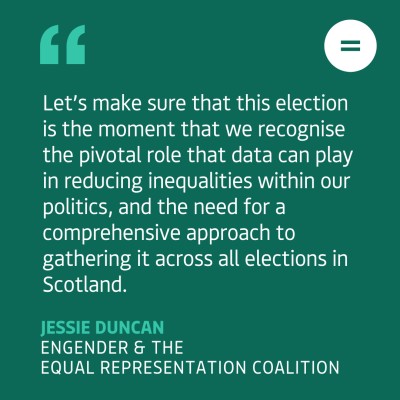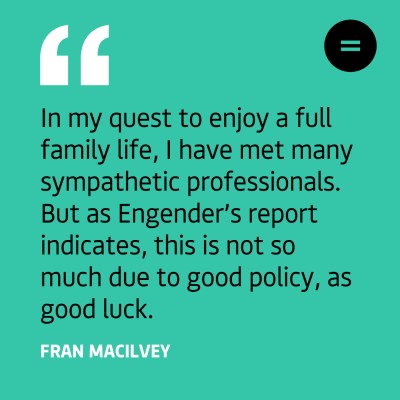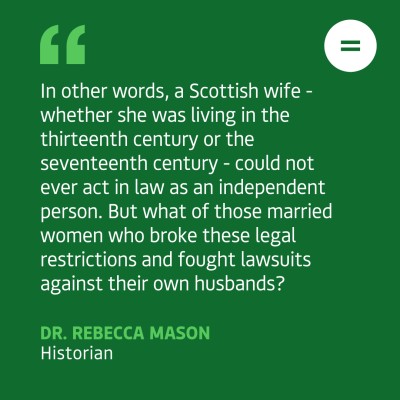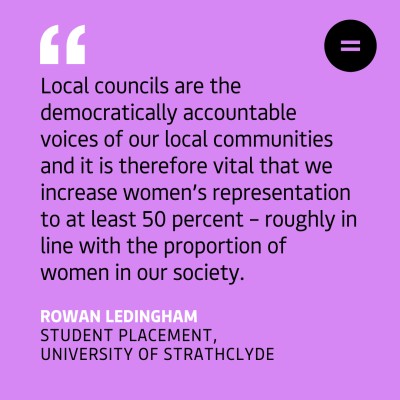Engender blog
All of Engender’s latest news. Reports, reviews, books, articles, and information from across Scotland’s women’s sector.
We would love to hear from other feminists around Scotland. Check out our guidelines for more information on how you can blog for us.
GUEST POST: Divorce and Women’s Rights in Scottish History
Dr Rebecca Mason is a historian whose work focuses on Scottish legal and social history, and women’s legal rights. She is currently writing a book on ordinary women’s navigation of legal systems and property relationships in early modern Scotland. In this blog, Dr Mason explores the complex history of divorce law in Scotland in the context of married women’s rights.
For centuries, nothing determined a Scottish woman’s identity more than her marital status. For a woman living in Scotland during the sixteenth century, her legal rights were inextricably connected to her relationship to a man: as a daughter to a father, a wife to a husband, or a widow to a former husband. Whether a woman was single, married, or widowed greatly defined her legal, social and economic opportunities during a time when men’s laws ruled women’s lives.
Prior to key legislative changes in the nineteenth century, Scottish legal rules concerning married women’s rights restricted a wife’s ability to own property, control real estate, enter into agreements, or initiate litigation without her husband’s consent. In other words, a Scottish wife - whether she was living in the thirteenth century or the seventeenth century - could not ever act in law as an independent person. But what of those married women who broke these legal restrictions and fought lawsuits against their own husbands?
While the legalities of marriage and divorce continue to evolve today, it is fascinating to uncover how women in heterosexual relationships managed the breakdown of their marriages in Scotland hundreds of years ago, including how separating and divorcing women sought to protect their rights during a time when they were afforded few.
GUEST POST: Women and Local Council Elections in Scotland
Today we're publishing the first in a series of blogs from the current student placements Engender is hosting from the University of Strathclyde Applied Gender Studies and Research Methods course.
In this post, Rowan discusses women's representation in local councils, and will be researching about why some women that were previously elected are not re-standing in the local council elections in May 2022. You can read Rowan's second blog here.
When I decided to apply to the Applied Gender Studies masters at Strathclyde, the prospect of a research placement at Engender was a big factor in my decision. Naturally, I am now thrilled to be a part of this organisation’s research into the experiences of female local councillors in Scotland and the reasons behind some women’s decision to stand down in the May 2022 elections.
The overrepresentation of men in positions of power in Scotland was made evident in Engender’s 2020 Sex & Power Report. More specifically, we saw that women make up just 29 percent of elected councillors at local authority level. Unequal gender representation in local councils reflects and compounds inequality in society, since we know the narrower the range of backgrounds, the narrower the range of experiences that are brought to the fore in political decision making. Local councils are the democratically accountable voices of our local communities and it is therefore vital that we increase women’s representation to at least 50 percent – roughly in line with the proportion of women in our society. On a more positive note, we now have a record share of MSPs, 45 percent, who identify as female. We are hopeful that similar progress will be made in the local council elections in May.
It is worth noting that there are currently no requirements to collect or publish information on the equality characteristics of candidates for elections in Scotland. This is because the UK Government did not enact Section 106 of the Equality Act to require that all parties are legally responsible to publish demographic data on their candidates ahead of any election. When this is combined with the paucity of information available on independent candidates, understanding the true diversity of candidates in our local authorities is somewhat challenging.
At the end of 2021, the Scottish Government set out plans to collect data on the diversity of candidates and elected representatives in the May 2022 elections. A questionnaire was designed to ask candidates questions about the protected characteristics set out in the Equality Act and to capture additional information on the socio-economic status, previous parliamentary experience and caring responsibilities of candidates. However, the questionnaire did not include questions exploring the experiences of candidates and any barriers they faced in seeking to become or while serving as a councillor.
The COSLA Barriers to Elected Office Special Interest Group has undertaken work to increase the diversity of local councillors and address the barriers to elected office. There are a number of key themes that emerge from their research:
- Remuneration. Councillors are unfairly compensated for the responsibility and workload of the modern councillor.
- Working hours. Councillors work full-time equivalent hours, making it difficult to maintain secondary employment.
- Working practices. Councillors face challenges when balancing other caring responsibilities with the role.
- Support. There is often a lack of support services from political parties and especially for independent councillors.
- Culture. Councillors are at greater risk of scrutiny, harassment and abuse than the average citizen.
Taking account of gaps in the current research and the barriers to elected office highlighted by COSLA, Engender’s research will focus on why female councillors are choosing to stand down from their position in the May 2022 elections. The hope is that this research will provide a more complete picture of women’s experiences in local government, the reasons why they choose to leave their role and the possible barriers to women’s equal representation in local councils.
In order to meet my research aim, I will interview female councillors from both rural and urban authorities to discuss their experiences and explore the reasons why they are not seeking re-election. I aim to interview 10 councillors from a sample of 4 or 5 different local authorities. Attempts will be made to achieve an acceptable geographical spread within the sample. Data from the interviews will be presented in a final report, and patterns and themes that emerge from the data will be explored and comparisons drawn between urban and rural authorities, as well as between independent and party-affiliated councillors. In addition, the report will present statistics and a breakdown of the gender representation of the candidates from the research sample.
I look forward to exploring this important area of research with Engender over the next few months.
Data & Equality in Politics
Between now and the local elections on May 5th, we will be publishing a series of blogs from the Equal Representation Coalition. They’ll be taking a look at the state of equality in our politics at the moment, discussing their work in tackle barriers to participation, and will be exploring the crucial role that accurate data plays in achieving equal representation in our councils and parliaments and why we need more of it. Here, Engender’s Equal Representation Development Officer Jessie Duncan is kicking us off with an introduction to some of the key issues and why gathering data is vital to achieving equal representation.

The Equal Representation Coalition brings together organisations from across the equalities sector in Scotland with shared goals around improving access to politics for people from underrepresented groups (with particular attention to women, minority ethnic people, LGBTI+ people and disabled people) in order to achieve equal representation in our councils and parliaments. Today the Equal Representation Coalition includes Engender, The Equality Network, CEMVO, Stonewall Scotland, Women 50:50, CRER, BEMIS, Inclusion Scotland, YWCA Scotland and ElectHer. The Coalition meets regularly to discuss their own work as well as current issues relating to equality in civic and political participation - and also to share learning and explore opportunities for collaboration. Notable to date has been the creation by some Coalition members of the Equal Representation in Politics Toolkit, a set of resources aimed at political parties to improve internal practice on equality, diversity and inclusion.
BAFTAs so...diverse?
Awards season is upon us: the 2022 ceremony for the British Film and Television Awards (the BAFTAs) took place on the 13th of March, and the Academy Awards are coming up fast. As always, with awards-fever comes discussions of representation, and in this blog, Dr Miranda Barty-Taylor reflects on the changes we have seen to the BAFTA awards, and whether they are enough to bring about women's equality in the arts.
-400.png)
When they are done right, or even when they are done wrong, awards ceremonies can highlight the work of women and other underrepresented people within the film and TV industry. They can increase the visibility of participation on screen and off, create role models, shift stereotypes and increase the popularity – and economic viability - of hiring diverse actors and producers. But beneath the veneer and rhetoric of equality, has there been any real progress, or do prestigious awards remain as exclusive as ever? In this blog I’m going to be focusing on how far the BAFTAs have succeeded in using process-driven changes in their regulations to affect diversity of representation in the awards themselves.
In January 2020, strong criticism was levelled at BAFTA following the release of their nominee lists. From an equality and diversity perspective, the lack of progress was stark; the nominees for the performer categories (best lead and best supporting) were all white, and for the 7th year in a row the nominees for best director were all men. The hashtag #BaftasSoWhite trended and a spotlight was again shone on systemic racism and more general exclusion from awards ceremonies. Discussion ensued around specific exclusionary practices in the nominations and longlisting processes: those categories awarded by jury decisions for example, are notably more diverse than those decided by voting alone.
Trapped: the call for a more flexible world
Fran Macilvey is an Edinburgh-based author. Her memoir ‘Trapped’ tells the story of her life with cerebral palsy. She has also published two self-help books which she thinks of as ‘gleaning something valuable from forty years of making mistakes’ and has recently finished writing three novels about women’s experiences with the law.

As part of a series of events being organised by Edinburgh Libraries to mark International Women’s Day on 8th March 2022, I was asked to take part in a panel discussion. Our brief, to publicise the life and work of an Edinburgh-based woman (or group of women, why not?) brought me to Engender, who invited me to contribute a guest post to ‘On the Engender’. I’m delighted and honoured to have this opportunity.
Reading Engender’s 2018 report, Our Bodies, Our Rights has been a vindicating – and at times, depressing – experience. It is a brave and realistic assessment (at last!) of the gaps in health and social provision that hinder disabled women in exercising their private and reproductive choices; in effect, their most basic human rights. Whether to have intimate relationships – read that again – whether to get married and have children, and how to bring them into adulthood while running the gamut of inconsistent and unpredictable help from professionally-minded others with rather mixed agendas. Thorny personal decisions which, as often as not, we have to navigate alone, in the face of fairly generalised ignorance and many misplaced good intentions. But this is only one aspect of the price that I, and countless others, continue to pay in our efforts to participate in mainstream life.
Downloads
 Engender Briefing: Pension Credit Entitlement Changes
From 15 May 2019, new changes will be introduced which will require couples where one partner has reached state pension age and one has not (‘mixed age couples’) to claim universal credit (UC) instead of Pension Credit.
Engender Briefing: Pension Credit Entitlement Changes
From 15 May 2019, new changes will be introduced which will require couples where one partner has reached state pension age and one has not (‘mixed age couples’) to claim universal credit (UC) instead of Pension Credit.
 Engender Parliamentary Briefing: Condemnation of Misogyny, Racism, Harassment and Sexism
Engender welcomes this Scottish Parliament Debate on Condemnation of Misogyny, Racism, Harassment and Sexism and the opportunity to raise awareness of the ways in which women in Scotland’s inequality contributes to gender-based violence.
Engender Parliamentary Briefing: Condemnation of Misogyny, Racism, Harassment and Sexism
Engender welcomes this Scottish Parliament Debate on Condemnation of Misogyny, Racism, Harassment and Sexism and the opportunity to raise awareness of the ways in which women in Scotland’s inequality contributes to gender-based violence.
 Gender Matters in Social Security: Individual Payments of Universal Credit
A paper calling on the Scottish Government to automatically split payments of Universal Credit between couples, once this power is devolved to the Scottish Parliament.
Gender Matters in Social Security: Individual Payments of Universal Credit
A paper calling on the Scottish Government to automatically split payments of Universal Credit between couples, once this power is devolved to the Scottish Parliament.
 Gender Matters Manifesto: Twenty for 2016
This manifesto sets out measures that, with political will, can be taken over the next parliamentary term in pursuit of these goals.
Gender Matters Manifesto: Twenty for 2016
This manifesto sets out measures that, with political will, can be taken over the next parliamentary term in pursuit of these goals.
 Scottish NGO Briefing for UN Special Rapporteur on Violence Against Women
Joint briefing paper for the UN Rapporteur on Violence Against Women.
Scottish NGO Briefing for UN Special Rapporteur on Violence Against Women
Joint briefing paper for the UN Rapporteur on Violence Against Women.

Newsletter
Sign up to receive our newsletter here:
Sign up to our mailing list
Receive key feminist updates direct to your inbox:

